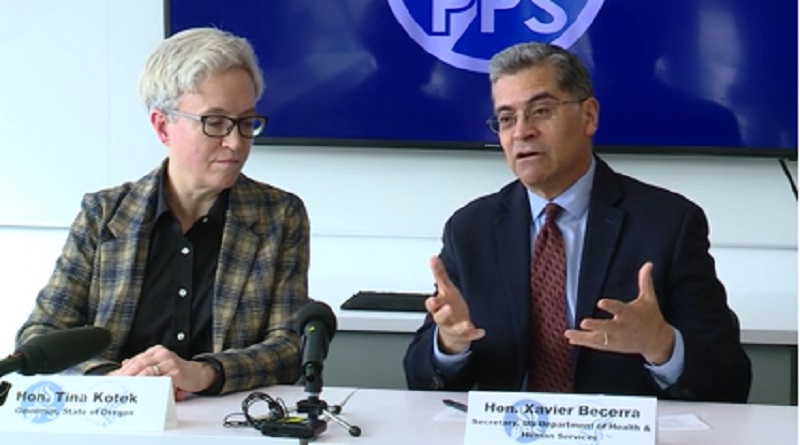PORTLAND, Ore. (KOIN) — More students in Oregon are being diagnosed with depression but there is a shortage of mental health professionals to work with them. On Monday, US Health and Human Services Secretary Xavier Becerra was in Portland as part of the Biden administration’s plans to strengthen mental health services for the youngest population.
Becerra said they plan on the federal level to add to the mental health professional workforce, including scholarships for graduate degrees with a promise to commit to working 4-5 years in severely underserved areas across the US.
Proactive students took their concerns directly to state and federal leaders.
“A lot of teens feel they don’t have the support that they need to feel comfortable reaching out to someone,” said Tanvi Vemulapalli, with Lines for Life. “I’ve heard so many contacts say they don’t have anyone in their life they can talk to and this is the first time they’re telling someone they’re struggling with something.”
Kotek and Becerra, along with other local leaders including Multnomah County Chair Jessica Vega Pederson, toured the Faubion School in Northeast Portland, which is now collaborating with the University of Oregon’s Ballmer Institute of Children’s Behavioral Health to research and create mental and behavioral health programs for K-12 students.
Students spoke with leaders about the issues contributing to mental health issues.
“I think students run into a lot of those problems, whether it’s burnout in academics, whether it’s home life and family problems or whether it’s problems with substance abuse. I think it really is what we’re seeing at a broader cultural level,” said Cleveland High School’s Byronie McMahon, a student representative for PPS’ Board of Education.
McMahon added the impact of escalating gun violence is also a factor. “It’s how those traumas and really life-changing moments impact students and I think it’s those same problems that’s just on the micro level within our schools, within our city.”
One measure state and federal leaders said they’re focusing on is continuing the suicide and crisis lifeline “988” that launched last July. The 988 line saw more than 2 million calls by the end of 2022, which Becerra said is 1 million more than the year before.
Anyone can access call or text-and-chat services, connecting them with mental health counselors.
“We’re not going to let it fall because there are still too many states that haven’t committed resources to it. We’re also now trying to shift to putting money into the post-call services because what we don’t want is for folks to feel pretty good about the call and then not get the follow-up they were expecting, because it’s like, ‘You listened to me for a moment and now I’m back where I was,'” said Becerra.

It’s important to invest in the mental health of youth, he said.
“Better to prevent than to remediate. I want to be there at the front end, not at the back end when it costs so much money,” he said. “That requires us to focus on young folks.”
KOIN 6 News asked Kotek how she plans to take their concerns and needs and make actual change in Oregon. The governor said it will come down to working with the legislature to budget for resources like Lines for Life, hiring mental health professionals and providing access to all communities in the state, not just Portland.
“We need everything. We need folks at the front end, we have folks with more acute problems that need to see, for example, a psychologist or a psychiatrist,” said Gov. Kotek. “I’m focused with working with the legislature to get those budget investments passed and then making sure they’re available. It doesn’t do any good to have folks if people can’t get there, so it is about access, as well, and making sure no matter who you are or what community you come from, you have someone who can be there for you.”